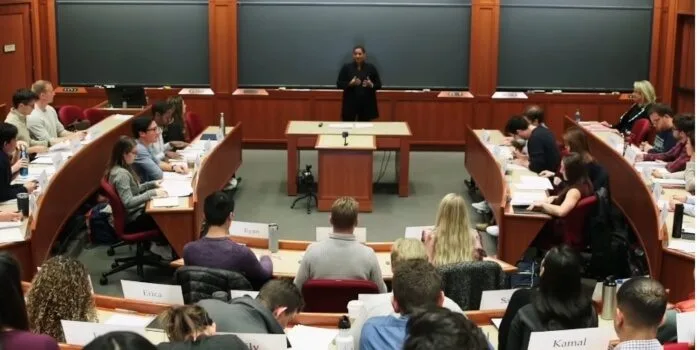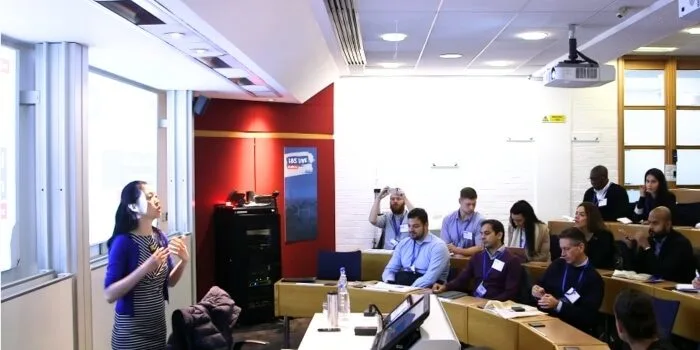Attending a conference on human rights and refugees is a vital opportunity to engage with pressing global issues. For individuals in Pakistan eager to make a difference, the journey might seem daunting but it is incredibly rewarding. Learning “How to Attend a Human Rights and Refugees Conference in Canada from Pakistan” opens doors to advocacy, knowledge, and networking that can amplify your voice and impact.
To participate, start by researching upcoming conferences in Canada. Apply for necessary visas and funding opportunities while preparing your travel itinerary. Engage with local organizations to improve your knowledge of human rights issues and build connections that can support your conference experience.
By immersing yourself in this transformative experience, you’ll gain invaluable insights and contribute to essential dialogues. Continue reading to discover practical tips and resources for making your conference attendance a reality.
What Does the Human Rights and Refugees Conference Mean?
A Human Rights and Refugees Conference serves as a vital platform for discussing the complex issues surrounding human rights violations and the plight of refugees globally. These conferences bring together activists, policymakers, scholars, and practitioners to share knowledge, experiences, and strategies for promoting human rights and supporting displaced individuals.

Attendees engage in discussions about legal frameworks, advocacy efforts, and the challenges faced by refugees in various contexts. The upcoming Human Rights and Refugees Conference in Canada, for instance, will provide a unique opportunity for participants to network, collaborate, and explore innovative solutions to pressing humanitarian issues.
Moreover, such conferences emphasize the importance of raising awareness and mobilizing communities to advocate for policy changes that protect the rights of refugees and marginalized groups.
By creating dialogue and collaboration among diverse stakeholders, these gatherings aim to inspire action and promote a more just and equitable world for all. Ultimately, a Human Rights and Refugees Conference seeks to empower individuals and organizations to make a positive impact on the lives of those affected by conflict and persecution.
How to Attend a Human Rights and Refugees Conference in Canada from Pakistan?
The opportunity to attend a human rights and refugees conference in Canada is an excellent way to engage with global issues, network with professionals, and gain valuable knowledge.

If you’re wondering how to attend a human rights and refugees conference in Canada from Pakistan, the process involves several key steps, from initial planning to active participation in the event. Here’s a step-by-step guide to help you get through the journey.
Step 1: Research and Select a Conference
Begin your journey by exploring upcoming human rights and refugee conferences in Canada that resonate with your passions and professional aspirations. Take the time to peruse various conference organizer websites, as they provide valuable insights into the event’s agenda, notable speakers, and themes.
As you sift through options, consider what specific topics excite you most. This thoughtful selection process will ensure that the conference you choose aligns with your interests, allowing you to fully engage, learn, and contribute to meaningful discussions.
Step 2: Request an Invitation Letter
After choosing the conference you wish to attend, your next step is to contact the organizers for an invitation letter. Registering for the conference is usually required, and this formal document plays a crucial role in your visa application by demonstrating your intent to engage in meaningful discussions on human rights and refugee issues.
This invitation letter not only confirms your participation but also highlights the importance of your visit. It sets the stage for your journey, ensuring you have the necessary support to handle the visa process smoothly.
Step 3: Apply for a Canadian Visa
Once you have your invitation letter, it’s time to apply for a Canadian visa. Start by visiting the official website of the Canadian embassy in Pakistan, where you’ll find detailed information on the specific visa requirements and the application process specifically designed for attendees of conferences.
Make sure to gather all necessary documents, including your passport and financial support evidence. As you take this exciting step toward participating in the conference, this preparation streamlines your application. Moreover, attending Human Rights and Refugees Conference in Canada will be a rewarding experience that enhances your understanding of vital global issues.
 Step 4: Book Travel and Accommodation
Step 4: Book Travel and Accommodation
Once you’ve secured your visa, it’s time to book your flight and accommodation. Planning ahead not only helps you find the best deals but also reduces the stress of last-minute arrangements. Look for flights that fit your schedule, considering arrival times that allow you to settle in before the conference starts.
For accommodation, consider staying in hotels or guesthouses close to the venue. This proximity not only offers convenience but also allows you to fully immerse yourself in the conference experience, making it easier to network and attend all the sessions without hassle.
Step 5: Prepare for the Conference
Preparing for a conference is essential to maximize your experience and engagement. Start by reviewing the agenda and familiarizing yourself with the speakers. This knowledge helps you identify sessions that relate to your interests and allows you to formulate thoughtful questions that spark meaningful discussions.
If you’re presenting, practice your delivery and refine your materials to ensure clarity and confidence. Being well-prepared not only improves your presentation but also creates connections with attendees, making your experience even more rewarding and impactful.
Step 6: Attend the Conference
Attending the conference is an exciting chance to immerse yourself in crucial discussions about human rights and refugees. Engage actively in sessions and workshops, taking notes to capture valuable insights and ideas. Don’t hesitate to ask questions—curiosity helps you gain deeper insight and enriches the conversation.
Networking is equally important. Connect with fellow attendees, share your experiences, and exchange ideas. Building these relationships can lead to collaborations and opportunities that extend well beyond the conference, allowing you to make a lasting impact in the field.
Step 7: Follow Up
Following up after a conference is crucial for building lasting relationships. Take the time to reach out to the contacts you’ve made, expressing your appreciation for their insights and sharing your thoughts on the discussions. A simple message can go a long way in showing that you value the connection.
Connecting on professional networking platforms like LinkedIn can help keep the conversation alive. Regularly engaging with their posts or sending occasional messages can lead to future collaborations and opportunities, strengthening your network in the human rights community.
Follow these steps to attend a human rights and refugees conference in Canada from Pakistan and enrich your professional and personal development.
What Topics Are Covered in a Human Rights and Refugees Conference?
Attending a Human Rights and Refugees Conference offers a unique opportunity to engage with pressing global issues and learn from experts in the field. These conferences serve as vital platforms for sharing knowledge, advocating for change, and building networks among like-minded individuals passionate about human rights. Here are some key topics typically covered at such conferences.
Refugee Rights and Protections
Discussions often focus on the legal frameworks and international agreements that protect refugees. Experts analyze the rights granted to refugees and the responsibilities of host countries to ensure their safety and dignity.
Asylum Processes and Challenges
A number of conferences focus on the complexities of asylum applications, including the barriers faced by individuals seeking refuge. Workshops may address the inefficiencies in the process and advocate for reforms to create more accessible pathways.
Human Trafficking and Exploitation
Human trafficking is a significant concern for refugees and displaced persons. Panels often highlight the intersection of forced migration and trafficking, exploring prevention strategies and support mechanisms for victims.
Mental Health and Well-Being
Mental health is crucial for refugees who have experienced trauma. Psychological support sessions aim to raise awareness about mental health challenges faced by displaced individuals and effective interventions. These sessions emphasize that joining Human Rights and Refugees Conference can provide valuable insights into best practices for supporting mental well-being in these vulnerable populations.
Social Integration and Community Support
Creating inclusive communities is vital for refugees’ successful integration. Discussions may focus on the role of local organizations, governments, and citizens in establishing environments that welcome and support newcomers.
Gender Issues in Displacement
Gender dynamics play a significant role in the refugee experience. Conferences often address how women face unique challenges during displacement, advocating for gender-sensitive approaches in policy and support services.
Advocacy and Policy Change
Empowering attendees to become advocates is a central theme. Workshops on effective advocacy strategies, grassroots movements, and policy change equip participants with the tools needed to drive meaningful action in their communities.
By exploring these topics, attendees gain valuable insights and practical knowledge to advocate for human rights and support refugees effectively.
What are the Agendas of a Human Rights and Refugees Conference?
The purpose of a human rights and refugees conference is to deal with a broad range of topics to address the complex issues surrounding human rights and refugee crises. Here’s a closer look at some of the typical agendas.
Addressing Human Rights Violations
This agenda focuses on discussing the various forms of human rights violations globally, including torture, arbitrary detention, and discrimination. The goal is to identify strategies to prevent these violations and hold perpetrators accountable.
Refugee Protection and Support
Conferences often prioritize the protection and support of refugees, focusing on their rights, safety, and well-being. Discussions may cover legal frameworks, humanitarian aid, and long-term solutions for resettlement and integration.
Advocacy and Policy Reform
A crucial agenda is advocating for policy reforms at both national and international levels. This includes lobbying for laws and policies that uphold human rights standards and provide adequate support for refugees.
Collaboration and Networking
Conferences provide a platform for attendees to network and collaborate with fellow participants. This agenda aims to promote partnerships between governments, NGOs, and other stakeholders to increase collective efforts in addressing human rights and refugee issues.
Education and Awareness
Another key agenda item is educating the public about human rights and refugee issues. This involves sharing stories, research findings, and best practices to increase understanding and empathy towards affected individuals.
Tips to Have a Smooth Attendance at a Human Rights and Refugees Conference in Canada from Pakistan
This can be a fulfilling experience to attend such conferences in Canada from Pakistan, offering valuable insights and networking opportunities. To ensure a smooth attendance, consider these tips:
- Early Planning: Start your preparations well in advance to avoid last-minute stress. This includes visa applications, travel arrangements, and accommodation bookings.
- Stay Informed: Keep yourself updated with any changes in the conference schedule or venue. Also, check for any travel advisories or health guidelines.
- Engage Actively: Participate in discussions, ask questions, and network with other attendees. Active engagement will enhance your conference experience.
- Be Prepared: If you’re presenting, rehearse your presentation thoroughly. For general attendees, prepare a list of topics or questions you’re interested in.
- Cultural Sensitivity: Respect the diverse cultural backgrounds of attendees. Be mindful of your language and behavior.
- Follow-Up: After the conference, reach out to the contacts you’ve made. This can lead to fruitful collaborations or friendships.
- Reflect and Share: Post-conference, take some time to reflect on your learnings and experiences. Share your insights with your peers or through social media.
By following these tips, you can have a smooth and rewarding experience at a human rights and refugee conference in Canada.
Frequently Asked Questions
Attending a human rights and refugees conference can be an enriching experience that connects you with advocates and experts from around the world. If you’re considering this opportunity from Pakistan, you may have some common questions. Here are some frequently asked questions to guide you.
Can anyone attend a human rights conference in Canada?
Yes, most human rights conferences are open to the public. However, it’s essential to check the specific conference’s registration requirements and eligibility criteria, as some may have limited access or specific focus areas.
Are there scholarships available to attend these conferences?
Many conferences offer scholarships or financial aid to support attendees from developing countries. Research the conference’s website or reach out to organizers to inquire about available funding options to help cover your expenses.
Can I present my work or research at the conference?
Yes, many conferences welcome submissions for presentations or papers. Check the conference guidelines for submission deadlines and requirements to share your insights and contribute to the dialogue on human rights and refugee issues.
Is accommodation provided for attendees?
Most conferences do not provide accommodation, but they often recommend nearby hotels or offer discounted rates for participants. It’s advisable to book your accommodation early to ensure availability and better prices.
Are meals provided during the conference?
Most conferences offer meals and refreshments, especially during keynote speeches and networking events. However, it’s always good to check the event details to understand what is included in your registration fee.
Can I volunteer at the conference?
Yes, many conferences welcome volunteers to assist with logistics and support attendees. Volunteering is a great way to gain experience, network, and deepen your awareness of human rights issues while contributing to the event’s success.
Wrap Up
Remember that attending a refugee and human rights conference is more than just an event; it’s a chance to be part of a global movement. The knowledge of “How to Attend a Human Rights and Refugees Conference in Canada from Pakistan” empowers you to take action and advocate for those whose voices are often unheard.
Be open to the knowledge you’ll gain and the connections you’ll make. Every conversation, every workshop, and every shared story will enrich your awareness of the challenges faced by refugees and marginalized communities. Your participation can inspire others and amplify critical discussions.
As you prepare for this impactful experience, carry with you the hope and determination to drive change. Together, we can shape a brighter future for human rights on a global scale.






